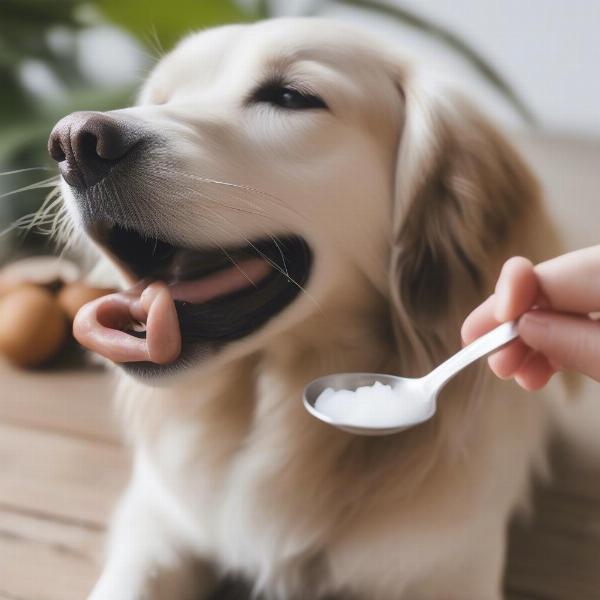Natural antibacterial solutions are gaining popularity among dog owners seeking gentler alternatives for minor wounds and infections. But with so many options available, it can be challenging to know which ones are truly safe and effective for your furry friend. This article will explore various natural antibacterial options for dogs, highlighting their benefits, proper usage, and potential risks. We’ll also discuss when it’s crucial to consult a veterinarian for professional advice.
Understanding Natural Antibacterial Options for Your Dog
Natural antibacterials offer a less harsh approach compared to conventional chemical-based products. They can be particularly beneficial for dogs with sensitive skin or allergies. However, not all “natural” remedies are created equal. Some are supported by scientific evidence, while others lack robust research. It’s essential to understand the difference and choose wisely.
Exploring the Benefits of Honey and Manuka Honey
Honey, a natural sweetener, has been used for its antibacterial properties for centuries. Its high sugar content creates an osmotic effect, drawing water out of bacteria, leading to their dehydration and demise. Additionally, honey contains enzymes that produce hydrogen peroxide, a potent antibacterial agent. Manuka honey, a specific type derived from the manuka tree in New Zealand, boasts even stronger antibacterial properties than regular honey due to its unique chemical composition. Both honey and Manuka honey can be effective for treating superficial wounds and skin infections in dogs. However, it’s vital to use raw, unprocessed honey and consult your veterinarian before applying it to any open wounds.
Coconut Oil: A Multi-Purpose Natural Remedy
Coconut oil is another natural antibacterial option for dogs, thanks to its lauric acid content. Lauric acid has demonstrated antimicrobial properties against various bacteria and fungi. Coconut oil can be applied topically to soothe dry skin, hot spots, and minor wounds. Some owners also add it to their dog’s food to support overall skin and coat health.  Dog eating coconut oil from a spoon However, excessive consumption can lead to digestive upset, so moderation is key.
Dog eating coconut oil from a spoon However, excessive consumption can lead to digestive upset, so moderation is key.
When to Consult a Veterinarian
While natural antibacterials can be helpful for minor issues, it’s crucial to seek professional veterinary care for:
- Deep wounds
- Puncture wounds
- Bite wounds
- Wounds showing signs of infection (redness, swelling, pus, or foul odor)
- Any wound that doesn’t show improvement within a few days
Your veterinarian can assess the severity of the wound, determine the underlying cause, and recommend the most appropriate treatment, which may include conventional antibiotics or other medical interventions.
Conclusion: Choosing Wisely for Your Dog’s Health
Natural antibacterial options can be a valuable addition to your dog’s first-aid kit. However, it’s essential to choose products wisely, use them appropriately, and consult your veterinarian when necessary. Prioritizing your dog’s safety and well-being will ensure they receive the best possible care. Remember that natural doesn’t always mean harmless, and proper veterinary guidance is crucial for responsible pet ownership.
FAQ
- Can I use any type of honey on my dog? It’s best to use raw, unprocessed honey for its optimal antibacterial properties.
- How often can I apply coconut oil to my dog’s skin? Start with once or twice daily and adjust based on your dog’s individual needs and response.
- Are natural antibacterials suitable for all types of wounds? No, they are typically best for minor, superficial wounds and skin irritations.
- What are the signs of a wound infection in dogs? Redness, swelling, pus, foul odor, and increased pain or discomfort.
- Can I combine natural antibacterials with conventional antibiotics? Always consult your veterinarian before combining any treatments.
Related Articles on ILM Dog
ILM Dog is your trusted international resource for all things dog-related. We offer expert advice on dog breeds, health, training, nutrition, grooming, and much more. From puppy care to senior dog support, we’re dedicated to helping you provide the best possible care for your furry companion. Our expertise covers a range of topics including breed selection, health and medical care, and nutrition. Contact us today for all your dog-related queries. Email: [email protected], Phone: +44 20-3965-8624. Connect with ILM Dog for personalized support and guidance.